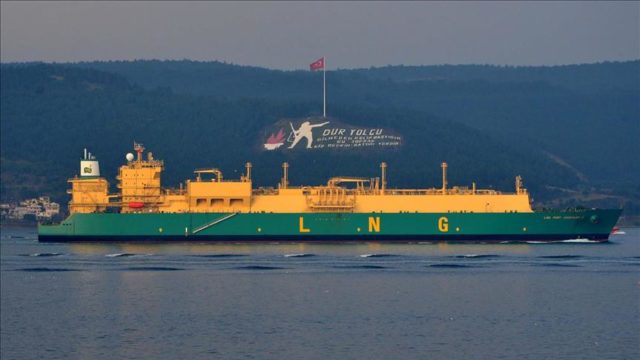As Turkey’s pipe gas imports drop, LNG reaches record high and US LNG raises market share, EMRA data shows
Turkey’s liquefied natural gas (LNG) imports reached a historic record high at 7.14 billion cubic meters (bcm) in the first half of 2019, according to Turkey’s Energy Market Regulatory Authority’s (EMRA) data.
The share of LNG in natural gas imports surpassed 30% for the first time in the January-June period out of the total of 23.29 bcm of natural gas imports, Anadolu Agency’s calculations reveal based on official EMRA data.
The country had imported 6.24 bcm in the first half of 2018 and 5.52 bcm during the same period of 2017, which corresponded to 24% and 19% of total gas imports, respectively.
As a result, the amount of total LNG imports in the January-June period increased 14% in 2019, compared to the same period of 2018.
The share and amount of LNG imports accelerated despite the drop in Turkey’s total natural gas imports in the first half of the year.
In total, Turkey imported 23.29 bcm of natural gas via pipelines and LNG terminals in the first half of 2019 — a 10% decrease from 25.95 bcm from the same period a year ago.
The decline in gas imports resulted from the low demand from gas-fired power plants in the electricity sector. In fact, winter was relatively soft and renewable power production – especially from hydropower generation – reached peak levels through spring 2019.
US LNG imports see more than fourfold jump
Turkey imported 884 million cubic meters (mcm) of natural gas as LNG from the U.S. over the January-June 2019 period, greatly surpassing that of the previous year of 191 mcm, marking a 363% boost.
In the January-June period of 2019, U.S. LNG constituted 12% of total LNG imports and 3.8% of total natural gas imports.
The increased share of U.S. LNG in Turkey’s gas imports was also echoed in U.S. LNG export data.
Turkey became the second biggest LNG importer from the U.S. in Europe and Central Asia after Spain, since the U.S. started exporting domestically produced LNG in February 2016, the U.S. Department of Energy’s LNG Monthly report shows.
U.K., France, Portugal, Italy, the Netherlands and Poland follow Turkey.
The same report showed that the price of U.S. LNG was on a downward trajectory. In January 2019, U.S. LNG averaged $5.66 for Million British Thermal Units (mmBtu) and gradually fell to $4.39 mmBtu in June.
In the first half of 2019, Algeria and Qatar remained the biggest LNG exporters to Turkey.
Turkey imported 2.94 bcm LNG from Algeria — a 37% increase from 2.15 bcm from the first half of 2018. The country imported 1.27 bcm of LNG from Qatar — a 34% decrease from 1.93 bcm from the first half of 2018. The rise in Algerian LNG imports essentially compensated for the fall in volumes of Qatari gas imports.
Faltering dominance of pipe gas in Turkey’s gas imports
In the first half of 2019, Turkish pipe gas imports fell by 18% year on year to 16.15 bcm. Over the same period of 2018, Turkey imported 19.71 bcm of natural gas via pipelines.
This decline is particularly evident in Russian gas imports. Turkey’s natural gas imports from Russia fell to 7.99 bcm from 12.57 bcm over the same period, equating to a 36% drop.
In January-June 2018, Russia’s share of Turkey’s gas imports was 48%, and this fell to 34% in January-June 2019.
Azerbaijan became the only country that increased its share of Turkey’s gas market despite the downward import trend of pipe gas in the first half of the year.
Azerbaijani gas exports to Turkey increased by 38% to 4.41 bcm in January-June 2019 compared to 3.20 bcm in the first half of 2018. The increase was mainly supported by inflows from the Trans Anatolian Natural Gas Pipeline Project (TANAP).
The 1,850-kilometer-long TANAP is the largest section of the 3,500-kilometer-long Southern Gas Corridor that was officially inaugurated during a ceremony held in Baku on May 29, 2018.
Additionally, natural gas imported from Iran decreased to 3.75 bcm — a 5 % drop from 3.95 bcm from the first half of 2018.
| (1.000.000 m3) BCM | TURKEY’S TOTAL GAS IMPORT | PIPE-GAS IMPORT | LNG IMPORT | RUSSIA (PIPE-GAS) | AZERBAIJAN (PIPE-GAS) | IRAN (PIPE-GAS) | ALGERIA (LNG) | QATAR (LNG) | USA (LNG) |
| JAN-JUNE 2018 | 25952 | 19711 | 6240 | 12566 | 3200 | 3948 | 2150 | 1926 | 191 |
| JAN-JUNE 2019 | 23287 | 16152 | 7136 | 7991 | 4410 | 3753 | 2942 | 1274 | 884 |
| RATE OF CHANGE | 10% DECREASE | 16% DECREASE | 14% INCREASE | 36% DECREASE | 38% INCREASE | 5% DECREASE | 37% INCREASE | 34% DECREASE | 334% INCREASE |
– Turkey’s potential as new gas hub
Turkey, with its central geographic location between east and west and established gas infrastructure, aims to become a natural gas trading center in its region. To this end, the country is expanding its pipeline network, the number of its LNG re-gasification facilities and also its energy exchange capabilities to allow for diversified gasification of southeast Europe and further, competitive penetration of more LNG exporters.
Turkey is also developing regulations to export gas to Europe. EMRA recently granted separate licenses to Shell and Turkish private gas company Aygaz for the export of natural gas from Turkey to Europe.
Following EMRA’s approval, the number of gas export licenses issued to companies increased to 14.
Energy Exchange Istanbul (EXIST), Turkey’s energy exchange company responsible for managing and operating energy markets, including power and gas commodities ensures transparent, reliable and secure market conditions. It provides equal access to all market participants by providing a counter-party guarantee in its transactions.
Turkey has exported gas to Greece since 2007, and currently meets almost one third of its annual gas demand. A capacity increase is on the table from the Kipi Export Point, where Turkey exports natural gas to Greece.
Moreover, the TurkStream project to carry Russian gas to Turkey across the Black Sea, will open up a new gas export option. With the completion of the TurkStream natural gas pipeline, the gas contracts of the Russian-Turkey Natural Gas Pipeline [West Line] will be transferred to TurkStream.
In addition, the Malkoclar Natural Gas Import Entry Point [Pressure Reducing and Metering Station] can provide a two-way flow of gas between Europe’s natural gas systems and Turkey as a second point, EMRA officials explained.
Turkey has four pipeline entry points and five Liquefied Natural Gas (LNG) re-gasification facilities, but with the TurkStream project coming online, the volume of daily natural gas imports is set to rise from 271.5 million cubic meters (mcm) to 334 mcm.
The country’s average natural gas consumption is 148 mcm per day, but can increase to 245-240 mcm per day in hard winter conditions. These new gas infrastructure investments such as new LNG facilities, and the new pipeline enable Turkey to have a natural gas supply surplus, which is one of the preconditions of becoming a gas hub.







